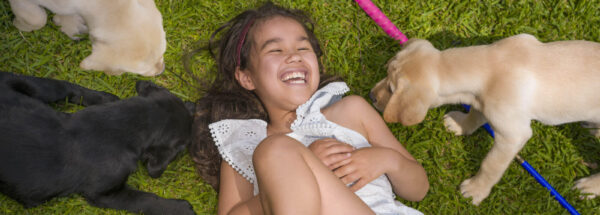The Paralympics is the goal.
You’re standing in front of a wide goal on a hard court with two of your teammates on either side of you. You’re blindfolded. The crowd is silent. You can’t hear anything except your own heart beating through your chest. Then, your ears pick up a faint jingle from the other end of the court. The sound gets louder and louder as you brace for the impact of a heavy ball hurtling at sixty kilometres an hour to hit your body. Funnily enough, you dive towards the jingling sound and consequently the ball, to stop it from entering your goal. You feel the ball hit your leg and the jingle stops. The crowd erupts in a cheer.
This is Goalball, a sport created for people who are blind or have low vision. Guide Dogs Client Zara has experienced the adrenaline rush of playing at an elite level for the last few years. She’s competed in the NSW Goalball team since 2019 and internationally for the Australian women’s Goalball team, the Aussie Belles since 2022.
“I want to go to the Paralympics one day. That’s been my dream for as long as I can remember,” Zara says.
Zara was introduced to Goalball at a Guide Dogs Youth Holiday Camp by one of the camp’s speakers, Goalball Paralympic Athlete Amy Ridley.
“Amy kept telling me to come and try Goalball just for fun so when I eventually did, from the first session I was hooked.”
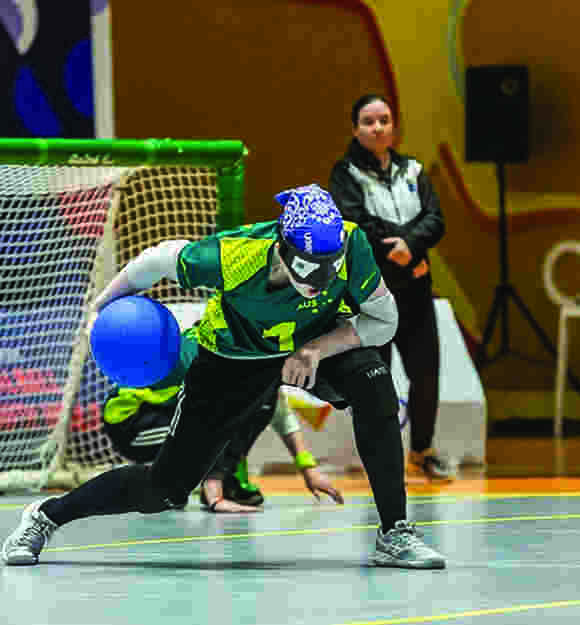
Playing Goalball at an elite level requires discipline and long hours of training. Zara fits in five training sessions a week by herself and with trainers in the gym, two on-court sessions every week and training camps with the rest of the team over some weekends. With players scattered all over the country, everyone travels interstate to attend camps to train intensively before coming home with feedback and implementing it at a state level.
“It’s a lot of self-driven training everyday but then we use the time we have together as a team effectively to work on combinations and strategy,” says Zara.
Even though her ultimate goal is to get to the Paralympics one day, Goalball has taken Zara to twelve different countries already, including the World Championships in Portugal and the Youth World Championships in Brazil where her team snagged a silver medal.
Many of the overseas competitions are International Blind Sports Federation (IBSA) qualifiers where teams compete for a chance to represent their country at the Paralympics.
However, jet setting is nothing compared to the community Zara’s met through the sport. Teammates have turned into gym partners and then into friends. Travelling together for weeks at a time always helps foster that strong bond.
“The community is the best part of it. We get along and squabble like a little family. Everyone’s got low vision so we can all empathise with each other and help each other out with different aspects of our lives.”
Colin stays connected
Colin is an active and involved member of his community. Whether he is volunteering, getting involved at his church, discussing current affairs with his men’s group, or performing at the local theatre, Colin strives to stay as engaged in community life as possible.
Colin has retinitis pigmentosa and is legally blind. At 88 years young, Colin is a long-time Client of Guide Dogs NSW/ACT and has accessed a range of services over the last 40-odd years. In particular, the Orientation and Mobility training Colin has received from Guide Dogs allows him to safely navigate the community, get to where he needs to go, and do what he is passionate about.
Colin is involved with a charitable organisation where he volunteers to provide cooked meals to those doing it tough. Once a week, Colin travels to the kitchen where meals are prepared. He helps by washing up and spending some time talking with Clients. Thanks to the training he received from Guide Dogs, Colin is able to call a taxi, get into the kitchen and confidently move around.
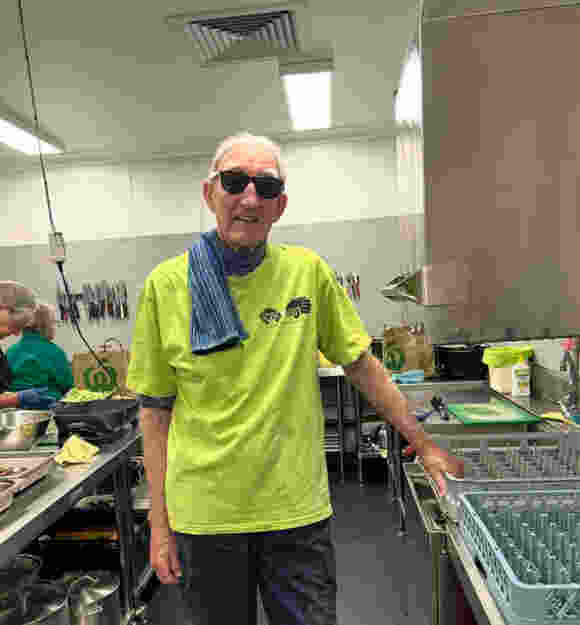
Colin is also actively involved in a choral group and in last 12 months has started singing with a local theatre organisation. He is currently involved in a three-week production of Priscilla Queen of the Desert. Much like a busy kitchen, Colin says that moving around the backstage of a theatre is like navigating a minefield. While he acknowledges he can’t do everything everyone else can do and may need a hand from time to time, Colin doesn’t let accessibility hurdles get in his way.
With the support and training he has received from Guide Dogs, Colin is able to navigate the chaos of the theatre and remain confident in his abilities to get involved in the community activities that are meaningful to him.
Bodie knows no bounds!
Everyone has a different idea of fun. For some people, the perfect day involves going to the movies, curling up on the couch with a book and going for a walk by the beach. For others, it’s sleeping in a bivy (a low-lying tarp held up at two points by rope) while it buckets down with rain after hiking with a heavy pack containing your essentials for the next 10 days. Guide Dogs NSW/ACT Client Bodie is one of these people.
At 14 years old, Bodie went to his first Outward Bound camp with Guide Dogs in 2022. He experienced what it was like sleep in the bush, cook outdoors on a fire and participate in team games and activities like high ropes and abseiling. From then on, he was hooked and attended another camp the year after.
“The first camp opened me up to the outdoors as my family isn’t really big on that sort of stuff. The second camp really helped me understand how lucky I was to have the independence I did when I was outdoor living,” Bodie said.
Bodie took the bush life in his stride so much that he was recommended by one of the camp’s instructors for a 10-day expedition that involved hiking every day, cooking for himself and the rest of the group and navigating to the next camping spot each night.
The expedition was challenging, but “there were so many highlights”, says Bodie. “But the best and most surprising part of the whole trip was when I was elected to lead the group for the last three days.” When Bodie was chosen by 13 other group members to lead them home for the last stretch of the trip, he rose to the challenge and experienced what practical leadership involved. At 16 years old, Bodie can proudly say he led a group of adults through the bush without getting everyone too lost, made sure the group tasks were completed and managed to survive a 24-hour period on his own with no instructors or other group members.
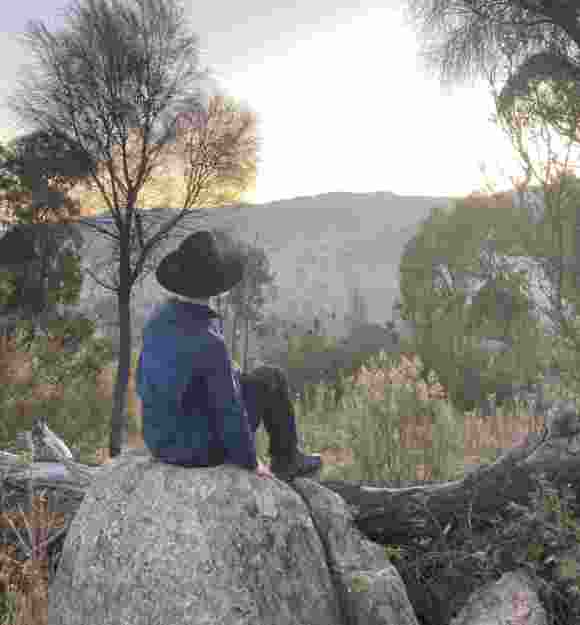
“The hardest part of the 24-hour stint alone was setting up my bivy by myself. Although when morning came, I was shocked to find out that my set-up was the best of the group,” Bodie says.
The expedition wasn’t all blue skies and campfire karaoke songs. On the longest walking day of the expedition, Bodie had to traverse through swamp and tall grass, so it was difficult to tell what was ahead of him. Stepping directly into the water meant his boots, socks and feet were soaked and freezing. “I have this distinct memory that night of the cold feeling around my toes. I was very glad I brought spare socks.”
When the trip was almost over, Bodie felt like he experienced a year in 10 days, but at the same time, he also felt like not much time had passed at all.
“We packed up our bivys and the rest of our stuff and when we were walking to get picked up, I thought ‘wait a minute, we aren’t going to be out in the wilderness anymore,’” Bodie says.
Upon reflection, when Bodie arrived home to the luxuries of suburban living, he realised the best part of the expedition was not experiencing bush life at all, but the opportunity he had to “meet the most wonderful people.”
“I learned the motivating power of music, how to accept help when you need it and I’ve made long lasting friends,” Bodie says.
The power of a Therapy Dog.
Imagine having nightmares almost every night or finding it difficult to leave the house by yourself, run errands and socialise because of the trauma you’ve experienced? This was the reality for Rachel, until she was matched with her Therapy Dog, Keanu.
The journey to getting a Therapy Dog is one that takes patience and perseverance. For Rachel, the wait was worth it.
Rachel has PTSD, and with that comes nightmares almost every night. Some nights, she couldn’t bear to sleep with the lights off. When Rachel spoke to a friend who had a Guide Dogs NSW/ACT Therapy Dog, she thought she would give it a try.
“I needed an affectionate dog that wasn’t easily distracted because I live in a busy city area where there are a lot of other dogs,” said Rachel. “I thought I was going to be waiting a while, but it all happened so quickly. Keanu seemed to be meant for me.”
Within seven weeks of being assessed and eligible for a Therapy Dog, Rachel received her match. When she was matched with her Therapy Dog Keanu, her life changed for the better.
Rachel was apprehensive at first about just how much a Therapy Dog could help her with her anxiety and PTSD. She didn’t expect all the little things Keanu would support her with, like her confidence and adaptability, let alone her nightmares and anxiety.
“I have PTSD and have nightmares all the time. Since being matched with Keanu, I have only had one nightmare within a month of having him,” Rachel says.
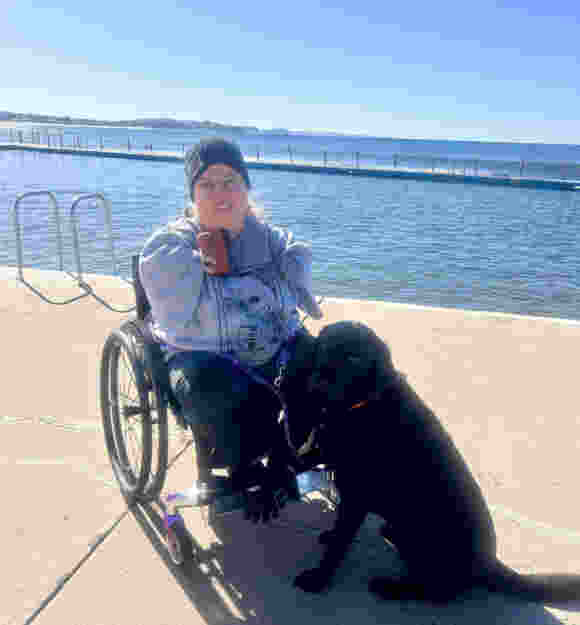
Before Keanu entered her life, Rachel used to stick to a strict routine and would only leave the house with her Support Workers. Now, she gets her morning coffee whenever she wants, hangs out with her friends and goes to her appointments by herself.
“My Support Workers used to come five to six times per week, but since I’ve gotten Keanu, they are down to two or three times per week. I have a lot more confidence to go out and do things by myself,” says Rachel. Keanu is now Rachel’s “little shadow” and comes with her wherever she goes. “He comes along to my therapy sessions and he does so well.”
Rachel and Keanu have learned to walk together and are continually practicing commands and recall skills. The positive impact Keanu has had on Rachel is incredible, as he provides her with comfort, companionship and emotional support.
Upon reflection, what’s helped Rachel the most is the reassurance she incidentally gives herself when caring for Keanu. Since Keanu is very attached to Rachel, he needs reassurance that they are both safe and together. When Rachel verbalises this out loud to Keanu, she also confirms her safety and stability in her own mind.
“First, I had to go and save my own life. I had to get well to make sure I could care for him, as he takes care of me,” Rachel explains. “Now when I’m telling him, ‘we are okay’, I’m also incidentally reassuring myself. It’s an unexplainable feeling knowing I can feel that way.”
With 86 Therapy Dogs matched with their new Handlers last year, it’s great to understand the powerful impact they have on our Clients to allow them to live life their way.
Puppy raising is pawsitively rewarding.
It takes a special person to be a Puppy Raiser; to love, nurture and teach a puppy for a year or more, then say goodbye, hoping their loyal friend will go on to change the life of a Client.
Margaret’s journey as a Puppy Raiser sparked from her unconditional love of her pet Labrador who had a hard battle with cancer. At that time, her vet suggested she consider becoming a Puppy Raiser for Guide Dogs NSW/ACT as part of her healing process.
Two decades later, Margaret is currently raising pups 26 and 27, Taji and Ossie. Over the years, Margaret has raised many special pups who have gone on to change the lives of people with low vision or blindness.
“It was very tough at times, but it’s worth the effort. Puppy Raising gives me a great feeling of achievement and before you know it, one pup becomes two, then three and so on,” says Margaret.
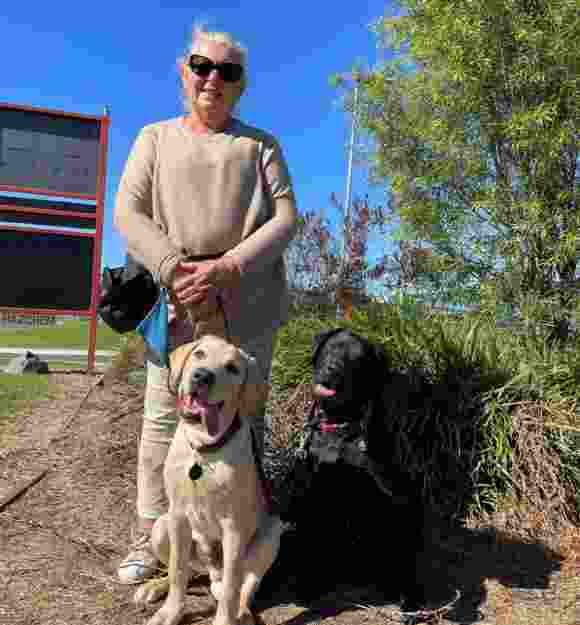
As a seasoned Puppy Raiser, Margaret has experienced the highs and lows of raising so many incredible pups. Even though saying goodbye still isn’t easy, knowing the impact these dogs will make on individuals and families makes it worth it.
“It’s a chance to give back to the community and change someone’s life. Whether the pup becomes a Guide Dog or a Therapy Dog, it’s a special feeling knowing they will be life-changing for their Handler.”
Raising and training a puppy is a challenging but rewarding experience. The 12 to 14 month commitment allows you to truly set the pup up for success before they embark on their Guide Dog training journey.
Whether it’s your first time or you have decades of puppy raising expertise, we encourage you to experience this incredibly fulfilling journey. Reach out to us today if you would like to be involved!
Shan celebrates 45 years
Last year, Shan Rowledge was presented with her Long Service Award by Guide Dogs NSW/ACT after an incredible 45 years of service.
Shan has worn many hats since she started with Guide Dogs in 1978 – from Assistant to the CEO to Client Services Administrator and now Receptionist – but regardless of her role, the one constant for Shan has been the altruistic nature of the organisation and its people.
“The culture and the rationale and the Strategy really of how we operate has always been what I would admire”.
Shan has unsurprisingly seen a lot of change since she began working for Guide Dogs, including the introduction of computers in 1985, which brought a monumental shift in the way people worked.
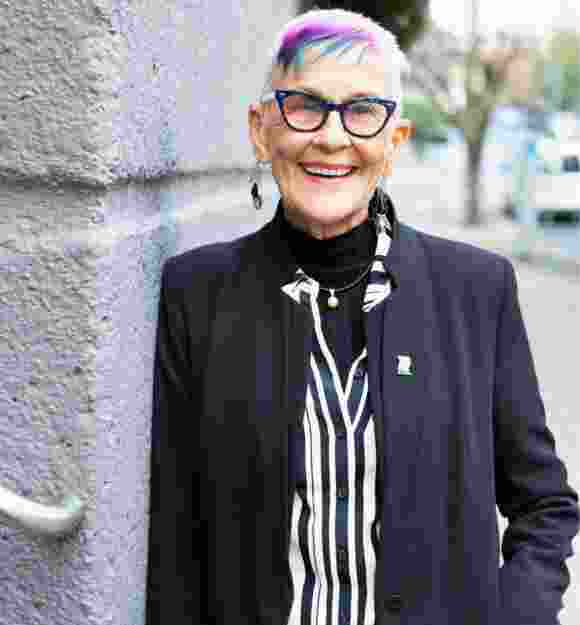
She has also borne witness to the incredible change in both the variety and scale of support Guide Dogs offer people with low vision or blindness. Guide Dogs NSW/ACT has grown from a small team operating out of Sydney into multiple teams working across regional NSW and ACT, providing all manner of services, including Orientation and Mobility, Occupational Therapy, Assistive Technology and more.
Beyond our services, however, Guide Dogs has grown to become a source of empowerment for our Clients as well as strong advocates for improved accessibility and inclusion of people with disability.
“Clients want more than just their mobility training. I think, you know, that’s the big change. I think it’s fantastic,” says Shan.
Congratulations to Shan on her incredible tenure here at Guide Dogs NSW/ACT.
Gulliver's Travels
Gulliver is our much-loved, giant 4.3 metre, fibre-glass yellow Labrador Guide Dog mascot. How does he get around? Gully’s Handler (driver) Paul, of course!
Paul has been a volunteer with Guide Dogs for 12 years and Gully’s personal chauffeur for 10 of them.
“I got involved with Guide Dogs when I saw an advertisement on TV and then I became a Puppy Raiser,” says Paul. From then on, Paul’s been volunteering his time selling merchandise at events, talking to people about Puppy Raising and becoming a Puppy Pal. When Paul was asked to drive Gulliver to an event 10 years ago, he fell in love with it.
“It was so much fun driving him around. I have an immense feeling of joy when I drive Gulliver and see the smiles on people’s faces when he passes by. Everyone loves to take photos of him too, so it takes me three times as long to get anywhere with Gully on my trailer because we get stopped all the time.”
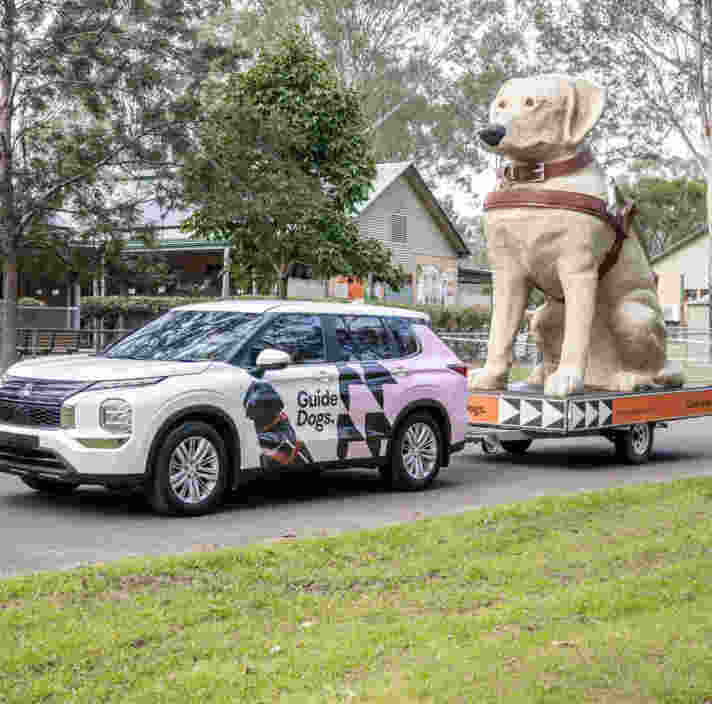
This year Gulliver led our Mardi Gras float entitled ‘Leading the Charge’ in an amazing multicoloured sparkly progress flag created by George Roppingly-Goode, winner of Making it Australia.
Paul described his experience driving Gulliver at Mardi Gras as “incredible.” He said, “I was so excited for Gully to be in the parade. It was such a special moment.”
He was also spotted on Bondi Beach to raise awareness for International Dog Day, and at our St Leonards office for International Guide Dog Day celebrations.
Paul drives Gully around because he “loves it so much. Everything about Guide Dogs manifests in Gulliver and I love to educate people about low vision or blindness when they ask me about him.”
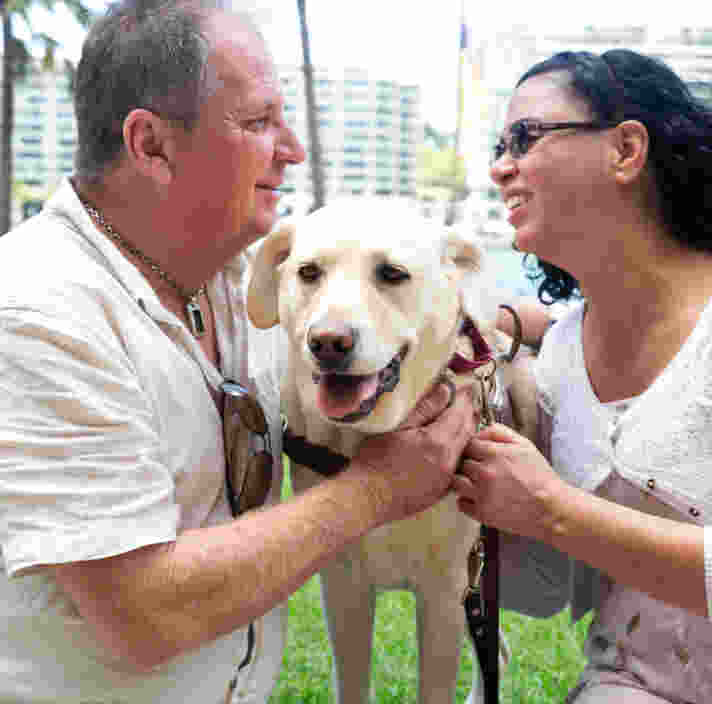
Angela is a true community champion!
ince arriving in Australia in 2008 with her late husband Norman and Irish Guide Dog Hamish, Angela has made it her mission to support Guide Dogs NSW/ ACT in whatever way she can. Being almost totally blind holds no bounds for Angela. Over the past 15 years, she has made a significant contribution to a range of fundraising and public awareness activities.
Angela first became involved in fundraising when she joined the Guide Dogs Central Coast Volunteer Support Group in 2010. She used her skills in public relations to speak and present at local schools, Probus and other community groups for seniors. Swimming at the local pool with Hamish close by her side was another opportunity for her to spread the word about Guide Dogs, whilst making lots of new human and four-legged friends!
With her reputation for public speaking spreading, Angela was invited to join the Guide Dogs Lived Experience Speaker Program. As part of the program, she attended events where she regaled supporters and members of the public with the wonderful and heart-warming stories of how her Guide Dog has changed her life.
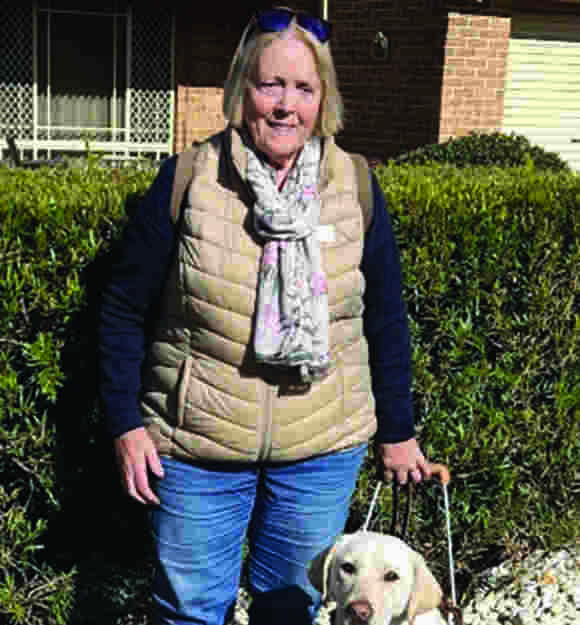
In 2018, Hamish retired and Angela was given her first Australian Guide Dog Piper, a beautiful yellow Labrador. The duo regularly attend fundraising stalls at shopping centres across the Central Coast where Angela has a chat to visitors about her initial experience with low vision. Angela provides information on Guide Dogs services and promotes the various ways people can help to raise funds.
With the knowledge that over half our dogs and vision services are made possible by gifts in Wills, Angela decided to extend her already generous support to include a bequest to Guide Dogs NSW/ACT.
“I would hope that by leaving a bequest, somebody else down the road will have the same life, freedom, independence and confidence that I get with my Guide Dog.”
This year, as Piper hangs up her harness to enjoy a well-deserved retirement, Angela welcomes a new member to her family, Guide Dog Jolie. Jolie is the sister of the Central Coast Supporter Group’s very own sponsored Guide Dog, Coastie! This is an extra special match for Angela, as one Guide Dog journey draws to a close, the next one begins.
Ready to continue?
Seems like you have filled this form earlier. Let’s pick up where you left off.
